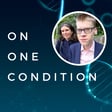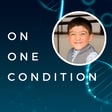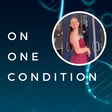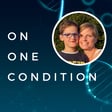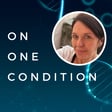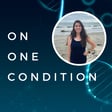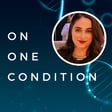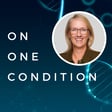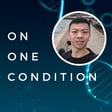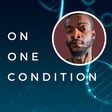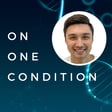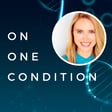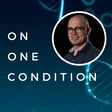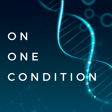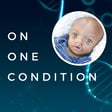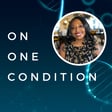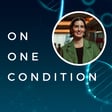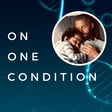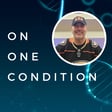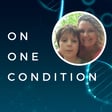Become a Creator today!Start creating today - Share your story with the world!
Start for free
00:00:00
00:00:01

Episode 44: Jamie Nicole - Hashimoto's Disease
Jamie shares her experience living with Hashimoto's disease, an autoimmune condition affecting the thyroid. She talks about how her symptoms, such as fatigue and joint pain, were often dismissed as normal, leading to a delayed diagnosis. We talk about how difficult it was for her to find a treatment for her narcolepsy, due to the lack of diversity in clinical trials. Jamie also shares how medication shortages are affecting her and others, and how dire the situation is in the US. Jamie is an advocate for more education about chronic illnesses, particularly in recognizing symptoms in children, and she highlights her work in increasing the understanding of autoimmune diseases.
The song that Jamie chose is Fight Song by Rachel Platten.
Transcript
Introduction to Podcast and Guest
00:00:00
Speaker
Hi, I'm Sylvain Bertolo, and you're listening to On One Condition, a podcast to raise awareness about health conditions by listening to people who live them every day. My guest today is Jamie Nicole, and we're going to talk about Hashimoto's disease.
Significance of 'Fight Song' in Chronic Illness Journey
00:00:15
Speaker
Hi Jamie, it's a pleasure to have you on the podcast. Thank you for joining me. Hello, and thank you for having me. It's a pleasure to be here.
00:00:24
Speaker
So yeah, we're going to talk about Hashimoto's and other things. But as always, I like starting with a song, which is a bit odd sometimes, but I like it. So what song did you choose and why? um I chose, which is probably a common song for people who have um gone through or have chronic illness, is a fight song by Rachel Platten because it talks about fighting to keep some aspect or thought of who you once were, um fighting for your life. It also talks about um being alone or feeling lonely, which um especially those with chronic illness, um whether it's in the diagnosis process so or actually finding out another way to live life in a different way with chronic illness,
00:01:23
Speaker
You oftentimes feel as though that you are alone in the process because it's hard to for others in your in your family or your friends to understand because they're not actually going um through it. I was talking about losing sleep, which I have also done a lot of, whether it be physically because that's a symptom or mentally because it's such a depressing, sometimes um an anxiety-filled process. So I feel like almost every component of that song um, represents, um, my personal journey with chronic illness. Okay. Um, and I'm not sure anyone else has said that it actually, um,
00:02:06
Speaker
um but it's interesting that you assimilate your journey to a fight. Is it really what it felt like?
Journey to Hashimoto's Diagnosis
00:02:16
Speaker
Um, absolutely. Going through the process of trying to get it, get a diagnosis.
00:02:23
Speaker
It not only felt as though I was fighting my body on a daily basis, it also felt as though I was fighting the system because there wasn't a lot of information out there. I thought that um but but but and before I was actually diagnosed with the Hashimoto's, I thought it was a plethora of different things or that my symptoms were common. And it was something that I was never going to find release for.
00:02:52
Speaker
And they're common, but they're not normal, ah it was which I found out in this process. Your body defies you no matter how good you, I was eating. And let me just go back to the, cause we're talking about Hashimoto's. How I even got diagnosed in the process was that I was just trying to lose weight. I had finished, you know, college. I had moved back home to Houston, Texas, where I'm from. I had gotten situated with my job.
00:03:21
Speaker
um And I had always for a long time had a weight issue that was fluctuating, but I also had other related health issues because of that. My blood sugar was irregular. um I would have irregular cycles. I was tired all the time.
00:03:35
Speaker
So symptoms that you would ah ah kind of um associate with living a busy life. I was also a full-time manager at my job, again, a single mother doing all the things. And I just wanted to take it back some control over my life.
00:03:51
Speaker
Type A personality, I got my business taken care of. So um I'm going to be in control of my body, which I later found out that was not possible and it's not going to ever be possible. I can do as much as I can on my end, um but I understand living life now. Mentally, I have to understand that in in spite of my best efforts sometimes, and my body will not act as though I'm treating it well.
00:04:17
Speaker
But that's all a part of the process. So long story short, I was going to the gym um every day. um i was I had the mindset of no pain, no gain. I was very determined. i So I would go to class on you know one day, ankle was full up, body was full up, symptoms I didn't know were associated with the Hashimoto's later on, joint issues, and still go back. I was drinking smoothies.
00:04:42
Speaker
um out my calories in were less than my My calories in were less than my calories out. were less of my calories out yes I was working out more and eating less and I still wasn't losing weight on top of blood sugar issues, on top of cholesterol issues. So I was following someone online who said that if you're doing everything right and you're still not able to lose weight, you need to go have certain things checked.
00:05:05
Speaker
Um, one of those things where, um, your liver for fatty liver and the other were a number of different hormones. And so in the back of my mind, I had no thought that I would actually end up having a chronic illness, but I did my research against type A personality.
00:05:29
Speaker
research that I had done. And then also with a diagnosis, which I thought it was. And um I had all of the symptoms of what's called PCOS, polycystic ovarian syndrome. And when I had the discussion with the doctor, um she thought it may have been not true, but when she tested my other hormones, um that's when on the first visit, I got diagnosed with the Hashimoto's thyroiditis.
00:05:52
Speaker
Okay. And so you mentioned something about um trying to lose weight and pushing yourself, if I understand correctly. Is that what um created the or generated the first symptoms? Or did you have Hashimoto's? It was always there, but it just exacerbated those symptoms essentially.
00:06:19
Speaker
I'm glad you asked that question um because again, a lot of this with most people with chronic illness, like hindsight is 20, 20. And I mentioned before, I had been having these symptoms for a long time and thought that they were normal.
Understanding Hashimoto's Disease
00:06:35
Speaker
And I don't think I explained what Hashimoto's is. It's and you know an autoimmune disease um that impacts my thyroid. So the inability to lose weight or, you know,
00:06:47
Speaker
easily gaining weight is one of the symptoms, which I've in retrospect, in elementary school, I gained weight all of a sudden from second to third grade. Okay. Um, in retrospect, I would get the flu a lot and you know, you can have a genetic predisposition for an autoimmune disease, but there has to be some type of trigger. So could that have been a trigger? Possibly. I knew a definite trigger.
00:07:14
Speaker
in my opinion, and I just got up for before we got, I hop on this podcast, a webinar with the Office of Autoimmune Disease Management, where they were talking about Epstein Barr as a trigger for autoimmune disease. oh Well, I had Epstein Barr in the ninth grade, um which, you know, people may not recognize Epstein Barr. They may recognize the term ah mono or mononucleosis ah more. um So I had that in the ninth grade.
00:07:42
Speaker
So after being diagnosed many years later, so imagine what, 14 years old, I didn't get diagnosed with my first autoimmune disease, chronic illness until I was 35. Wow. Okay. Had I, number one, being aware of the symptoms in my family as well, because in hindsight they were obvious. ah One of the symptoms with autoimmune disease in general, but especially with um Hashimoto's is fatigue.
00:08:12
Speaker
I, at one point in high school, now mind you, again, type A personality. I had a lot going on. I was in many different organizations, AP classes, taking college courses, but I was, I'm not sure if you have that, this where you are. It was, it's a pill called notos. It's like caffeine and appeal. Um, I was popping those at one point, like they were kick tacks. Um, secondly, um, you know how sometimes your parents have these assumptions in these old school remedies. So,
00:08:40
Speaker
I was told to take Gerritol, so I would drink Gerritol. You would normally see that for you know older individuals. I was drinking it straight out of the bottle in high school because I thought it made me my iron that was low. So to your question, these symptoms, I have become so used to feeling bad that I thought that it was my norm. And oftentimes when I'm telling the story of from when I was having the symptoms to after diagnosis when I started putting the pieces together. You know, I don't see you have glasses on, but I wear glasses. So it's when you first get glasses or you think you need glasses, you're like, I can't see, I need to go get glasses. But I didn't realize how blind I was until I actually got the glasses. I didn't understand how sick I was or that the symptoms weren't normal until I got my diagnosis and started putting systems symptom systems in place.
00:09:34
Speaker
and also on medication as well, that made me realize that, oh, the things that I've been feeling over the past 20 years are not normal at all. So my sense of it being normal, when I would go to the doctor, there was no sense of urgency. There was no sense of alert. The only way that I really got into this process was I was just trying to lose a little weight.
00:10:02
Speaker
Yeah.
00:10:05
Speaker
which is i mean In a way, it's it means that Hashimoto's doesn't affect you so much, if if I understand correctly. um But we'll come back to that. It's interesting that you were talking about fatigue.
00:10:24
Speaker
But like teenage hood, your body changes so much, that like you're pushing yourself as well, mentally, physically, a lot of the time, that being fatigued is not uncommon. So it it must be very hard to actually catch Hashimoto's at that age. It's common for people to be diagnosed later on in life.
00:10:53
Speaker
It is common for people to be diagnosed later on in life, even though, and I'm glad you asked this question, a lot of the symptoms present themselves.
Challenges of Diagnosis and Stigma
00:11:03
Speaker
I'm having um actually a webinar later on, specifically for kids. and In addition to what I have going on as a health coach, I also have a nonprofit. And most of the people on my board are people with chronic illnesses, specifically autoimmune disease. And one of the mantles that we have taken up is educating parents on these symptoms and how to better recognize them in kids. Um, for example, um, across the board, whether it be, you know, uh, not only immune disease like lupus or Hashimoto's or, you know, juvenile arthritis, a lot of, a lot of parents may pass that off as, Oh, uh, my child is just having growing pains or the child being excessively tired during the day.
00:11:49
Speaker
they may think is a lack of interest in school or you know a lack of willpower or lack of enthusiasm about being in school or like me I was excessively tired during the day but I also had insomnia at night so I was staying up late and so the coordination of if you just if you would just go to bed then maybe And you would have energy during the day, but that wasn't the case. I could be laying in bed and fully ready to go to sleep and be wide awake for hours until three, four in the morning. And when I wake up in the morning, my way of coping with that, you're talking about excessive um or signs. ah One of the signs that a parent could pick up on it is that I have multiple alarm clocks.
00:12:34
Speaker
And when I say multiple alarm clock, I would put them not by my bed. I would put them on different sides of the room. I know we have the snooze button, but in order for me to actually get up in the morning and stay out of the bed, it was like almost like a Russian roulette where I'm getting up, hanging out, going back into the bed then the next two minutes. And I had them set for different times and hit snooze at least once or twice on each of them. And that would be my method of of of making myself get up in the morning. um The other one was um Yeah, teenagers are are tired. I was, ah not to just put this out there, I was in the top.
00:13:12
Speaker
five graduates of my school, of my class. um So I was interested in school, but I could not function. It was one class, my calculus class, that was after lunch. I would literally be asleep on the back of the room on the floor with my backpack, because I could not function in class. And even if I was awake, it's almost as though I hear you, but I don't understand what you're saying. So I'm in a fog while they're giving the the the lecture, the presentation,
00:13:42
Speaker
um One of the ways I kind of compensated for that on times that I could Get up early earlier in the morning or sometimes I would just stay awake and not go to sleep And I had made friends with the janitor and the janitor would let me in the building earlier my calculus teacher would be there And he would let me go through the problems because again my my brain functions a little bit differently oh not because specifically because of the Hashimoto's, but partly, um but also because I have another chronic illness, which is narcolepsy. And so for me, that means I retain information a little differently as well. um um I need to see it and to do it, um not just to watch a lecture. um So I was able to not get behind in my classes, um but I could not stay awake during class. And luckily I had an understanding teacher and he knew that I was trying.
00:14:34
Speaker
um Which is another point, too. It's not just on the teach on on the parents. The teachers is one of the things that we're trying to educate them on because they see our kids the majority of the day. And so they should be able to pick up on those signs as well and be able to assist the student in getting the resources that they need to find out what else could it be besides, oh, they're just a teenager, they're just a child.
00:14:57
Speaker
Yes, but then again, so i mean I think it's great what you're doing about educating people because that's what I'm trying to do with this podcast as well. and But I can imagine as a teenager going to a doctor's sharing, I'm feeling tired all the time. ah It's hard to get up in the morning.
00:15:20
Speaker
Is it enough for a doctor to take that teenager seriously and do more tests than, oh, you just you're just growing, you need to catch up on your sleep during the weekend? that That is an excellent observation. And I would agree with you because that's the battle that we're fighting as adults. There is a there is a um four to five year time span for an adult to get a diagnosis, right? And when I talk about um the anxiety and depression that I felt, that while going through the process of getting the additional diagnosis, that was part of my hangup. No one is going to understand if I just say that I'm tired, especially in America. I've talked i've talked to a few Europeans about how we overwork over here, that it's the culture of go, go, go all the time.
00:16:21
Speaker
afraid of me saying, I'm tired and not having a diagnosis behind it. The fear of them saying, well, me too, because again, a lot of people think that that symptom is normal, but it's not normal. It's common, but they don't realize like when I was telling the doctors and I was going and trying to explain this process, remember I got a diagnosis. I got a diagnosis of Hashimoto's in 2015.
00:16:48
Speaker
And then it was a process of four years later of still going back and forth to the doctor to figure out like, okay, I'm on medication for the Hashimoto's. Why am I still this excessively tired? Now, mind you, I was in college, married, divorced, two kids, working full-time supervising people and getting my master's degree in accounting. At this point, after a couple of years, I'm in the doctor's office crying.
00:17:14
Speaker
same Same doctor that diagnosed me with the Hashimoto's. I'm like, look, ma'am, doctor, I know what tired is. Married, divorced, two kids, single mom, working full time. This is beyond tired. If I had not continued to advocate for myself.
Path to Diagnosis and Treatment
00:17:32
Speaker
If I had not had a doctor that didn't just go off of labs because my Hashimoto's labs, you know, four, you know, three or four years later with the medication were in the functional range. So there's something else that's going on.
00:17:45
Speaker
um I had an Epstein-Barr flare. I had issues with fibroids. I adjust all of those, very proactive in getting all of those taken care of, but I was still exhausted. And every time I would go in, and which is why I love this doctor to death, she had a checklist in addition to the labs that she looked at and we had a discussion about. And every single time, instead of one check mark by you know exhaustion and sleep, I would have multiple. And again, it would go into where like I couldn't even function at the doctor's office sometime. When I'm waiting on her, they put you in the room. I turn off the lights, lay down and take a nap. I couldn't even stay a awake during my appointment. And she's the one that eventually after we went through you know everything else that it can possibly be, vitamin deficiency, who she's the one who recommended that I get to sleep study.
00:18:37
Speaker
and Okay. So that's narcolepsy then. or Does Hashimoto's also impact your sleep? or is It does. It does. The excessive tightness, the excessive fatigue,
00:18:52
Speaker
Um, I think for me, the difference is, um, because I caught it somewhat early, my antibodies weren't as high as some others. So the more damage that I think has done to your thyroid and your body, um, people have, um, can have excessive but fatigue more than I did with the Hashimoto's alone. And then also you mentioned the timeframe. I believe as I've gotten older, I've gone through life's transitions.
00:19:23
Speaker
it has become harder to navigate. like Now, as I get closer to perimenopause, there's some overlap. When I was younger, it may have been easier to manage, or ah again, in the back of my mind, I felt as though because I'm in college, I'm doing all these things, the insomnia was a benefit because I can stay up late.
00:19:44
Speaker
yeah and get my work done. But as I got older, as I had kids, as I had other responsibilities, it it got harder to manage over time. Yeah. So going back to Hashimoto's specifically then, what are the symptoms then that people should should look for? I mentioned a couple already. um The inability to lose weight,
00:20:11
Speaker
um gaining weight without um a known cause. Like it didn't matter if I ate a donut or a salad. um Joint issues. We talk about binder. At this point in time in my life, I have a binder. um And the the biggest part of that binder is the orthopedic doctor I've had. And I have a box of braces. I've had ankle issues. um I've had knee surgery on my right knee. I'm starting to have um issues with my left knee.
00:20:41
Speaker
I recently had two surgeries last year, one on my right shoulder and one on my left. Again, those symptoms started in 2018 and I had no clue that I would eventually need to have surgery, but the symptoms have just progressed over time with no known cause. I could go to bed fine and then wake up with something is is wrong.
00:21:06
Speaker
Went to bed fine one time, woke up, couldn't move my my my big toe for a week. So I made an appointment. I'm like, okay, maybe it's gout. So there's random things like that. I woke up um one day, my shoulder, couldn't move it. I couldn't take off my clothes. I couldn't put on a shirt. I could not do anything. And that has actually landed me in the minor ER more than I would like to say. The fatigue is another that I hear a lot I mean, it's not just normal fatigue that you would experience, you know, just being a human being, having life responsibilities. It's an inability to function. but if we would If I would tie it with the overlap of the Hashimoto's and the narcolepsy, I think the narcolepsy is a little worse, but it's as though you have not slept for 72 hours and you're trying to stay awake.
00:21:56
Speaker
Okay, okay. I can imagine then like brain fog, difficulty to process things. Things that they do when they when they torture people. believe know They're keeping them away, right? They're keeping them away from that mom. So you feel as though yeah you're tortured.
00:22:12
Speaker
And then with that, coupled with mood disturbances, a lot of adults specifically say just with Hashimoto's, but with, you know, autoimmune disease in general, um anxiety, depression. As a, as a health coach, I've had most of my clients be referred to me from psychiatrists or counselors and because those people to your point have gone to the doctor.
Misdiagnosis and Medication Trials
00:22:36
Speaker
Their symptoms have been dismissed. um You just need to get more rest. You just need to eat better.
00:22:42
Speaker
without digging further. And so, and because there's so many different symptoms that go along with that, people often are diagnosed as being hypochondriacs. And so they've been referred to psychiatrists or psychologists or counselors um instead of the doctor actually digging deeper. um Other ones are sensitivity to cold, um constipation. You may have um difficulty conceiving. So Anything to do with your your thyroid because it's a type of um hyperthyroidism, but they the impact is on your immune system. That is attacking your your thyroid. That's the issue. So you can have a multiple multiple different symptoms that people may often associate with just being normal, but they're common, but they're not normal. and Okay.
00:23:32
Speaker
Thank you. That's very useful, I think, to list all the symptoms and going back to trying to catch those symptoms early and and not think that it's just tiredness.
00:23:45
Speaker
I'd like to move to narcolepsy now. so We've already covered narcolepsy on the podcast, so we're not necessarily going to talk about how it affects you ah too much. but Something that you shared when we were preparing for the podcast is that you've been on treatment for narcolepsy experience with that treatment wasn't positive. I'd love for you to share more with our listeners. No no problem. um So it's kind of um what I was mentioning earlier um with the the Hashimoto's and
00:24:24
Speaker
you know, getting on the right medication in my labs, and coming back from for that in the functional range, um but still having this excessive fatigue. And so the fatigue became so bad. um You know, through the process of having the Hashimoto's in that diagnosis, I had progressed at work, I had become a supervisor. But I would be in and the office with my employees, and again, that brain fog, and like,
00:24:53
Speaker
I'm doing reviews, I hear what you're saying, but I don't understand what you're saying. And so I was going back to the same doctor, going through the process of elimination to see what it could be. One of the things that um was addressed was I had an Epstein-Barr flare. So I mentioned that I had the Epstein-Barr in ninth grade.
00:25:15
Speaker
And that could be a trigger for autoimmune disease. I didn't realize at the time, this was two years after the Hashimoto's diagnosis, two years before the narcolepsy diagnosis. um That is similar to when you have chicken pox and it remains in your system. And then you can have shingles down the line. I had no idea that I can have an Epstein bar flare.
00:25:36
Speaker
Epstein-Barr flares have also been known to cause chronic fatigue, and it was so bad that I had to get what we call here in the US FMLA where I had to take time off from work because the fatigue was so bad. um In addition to that, after I got that address with my doctor and was when was on antivirals, I had another issue with fibroids, which which are again, in hormonal issues you can have with the Hashimoto's. Going through the process of elimination, thinking that was the cause of my excessive fatigue.
00:26:06
Speaker
So long story short, um I go through all of those and I'm at the doctor crying. And she's like, I think you may have narcolepsy. ah Now, in the back of my mind, I'm like, narcolepsy, who gets that? Because you only see what you see in the movies, and I didn't have that. And that goes back to your your prior point, skipping ahead a little bit, there are different types of sleep disturbances. um I don't have type one, which has cataplexy where with um different emotions, whether they be good or bad. You go into this like almost state of, I wanna say paralysis, but it's almost like you're you're out of it for a while, but similar to what you see on TV. I didn't have that. So had I had that, I think I would have been diagnosed earlier year in my in my youth. um So she recommended me go get a sleep study. So that's what I did to my own detriment.
00:27:00
Speaker
I was still in ah in denial a little bit. So i didn't i didn't I didn't make the appointment right away. And when I finally got to to the end of my rope and I made the appointment, I couldn't get into the sleep doctor until six months later. Finally had these sleep tests.
00:27:14
Speaker
and i'm I won't go into how they do the sleep test unless you want me to, but long story short, I got diagnosed with the narcolepsy type two, which in my mind, as as a type A personality, a fixture, I'm like, okay, I know what it is. I can fix it. um As you were mentioning earlier about the stigma of not wanting to say, oh, I'm just tired. I felt that. and so that added to my anxiety because I didn't want to tell anyone for fear of what they were going to say. So for me, I thought the diagnosis was a good thing, which it was, but I did not realize the time and frustration it would take to find the proper medication for me. So after I got diagnosed,
00:28:00
Speaker
there were several different medications that they tried on me. And I i guess what for insurance purposes, they have to kind of go through the process of the lower level drugs before they get to things that they think will be more beneficial. The problem for that for me is that I had been going through this process for so long and it had already started to impact my job. And so for me, the the medication would have been a thing that saved me, but it wasn't because of There not being any tests done on people who look like me, black African-American women. The medications that they put me on weren't necessarily what's best for me and actually caused additional issues, caused hormonal issues. So for a while I went through the process of not being able to um be on a a medication that was working for me and that actually made my symptoms worse. um The doctor that I was sleep seeing at the time,
00:28:55
Speaker
Luckily, because not everyone has this experience, referred me over to another doctor in his practice who happened to also be a black African-American woman who was also a neurologist. okay And so she had a little more insight specifically for how things may differ for an African-American woman. So we went through the process of trying different medications. Long story short, I ended up on being also being being on on two different medications.
00:29:22
Speaker
Um, one for the day for the excessive daytime sleepiness and another for the insomnia. And I'm not sure if you're familiar with, uh, drugs for insomnia. I wasn't at the time. One of them is called GHB. I believe that got that right, which is technically what they consider the date rape drug. Whoa. Okay. So for that one, you have to, it's, it's a special medication that they send mail order that you can only get you.
00:29:51
Speaker
I have to talk to a nurse every month in order to be said. FedEx has to send it directly to your house and only you can sign for it because of because of the nature of what it actually is. And so there's two vials that you've taken in the night and I won't go all into that. But long story short, I started having issues with that medication as well. um So much so that well I would be sitting down and I would see my heart rate spike to 143. I would have busy spells.
00:30:21
Speaker
yeah um And this was maybe like nine months after diagnosis that I'm still having these issues finding the the correct medication. Eventually I got off of that nighttime medication. I made some other lifestyle interventions that were still on um the medication for daytime because of daytime sleepiness. And things were going well for a while until this last year in 2023, when there was a medication shortage here in the US.
00:30:49
Speaker
Um, this is also around the time where, um, I was having my surgery.
Impact of Medication Shortages
00:30:54
Speaker
So what was going on in the U S is because, um, probably because of COVID after doing my research, I found out there was an increase in the number of people who were diagnosed with ADHD. The medications that they prescribe for the excessive daytime sleepiness for narcolepsy are the same medications that they use for ADHD.
00:31:15
Speaker
So now we have multiple conditions battling for the same resources. yeah So I cannot find the medication anywhere. I am on um chat groups, having discussions with other people who are having these same problems. People are having to drive to different states, drive an hour to a different pharmacy.
00:31:37
Speaker
of me personally, um I would have to get different medications. um Sometimes, and I'm having this issue for a while, it was okay at the beginning of 2024, but i even since the last conversation we've had, I'm having issues where the medication is changing every month. Again, the issue with that is because the different medications either work differently or cause different side effects. as i As I had when I first started on the prescription journey,
00:32:07
Speaker
that could actually make things worse than better for me personally. So out I was, but one of the medications that worked for me best was Ritalin. So then I have, they didn't have any Ritalin in stock and in any milligram. So then I was put on on another one called Focalin. I would be on Focalin trying to get that prescribed the following month. There is no Focalin because everybody is trying to get the same resources. So now I'm on Adderall, right?
00:32:36
Speaker
In an Adderall for a while, this past month, there is no Adderall, there is no focal length, there is no Ritalin. The only thing that my pharmacist has, now I think I'm on, originally was on 10 milligrams twice a day tablets. So in order to kind of um mitigate the issues that we're having with the pharmacy, I'm like, okay doc, can we increase the dosage that you prescribe I don't need the 20 but I'll cut it in half so the next month if it takes me two weeks longer to get my prescription I won't have run out. So we do that. So now they don't have the 20 milligram. All they have is the 30 milligram capsules which is not a tablet that I can split in half.
00:33:24
Speaker
I have to open it up with those little balls inside yeah and try to measure it out exactly. So now it's 30 instead of the 10. So now I'm trying to measure in the little bitty balls. bow for me, the headache of that. Now I'm grateful to be able to get something because I absolutely cannot function without that medication. It's a little bit different for ADHD versus narcolepsy because it's Can I focus and concentrate on one thing versus can I even function? Imagine someone who has to go to work with narcolepsy not having medication and being on the road. There were times when I was unmedicated, didn't know I had narcolepsy. Like I'm on 10 and two on the wheel praying to get home. um I stop at an ATM, I'm falling asleep. I can't sit in traffic. It becomes dangerous um to not have the medication if you have narcolepsy. You have narcoleptics who are traveling across the state.
00:34:23
Speaker
to find a pharmacy that works. You have desperate times cause for desperate measures. So now in these groups online, we're just trying to figure out whatever works. There are groups that we are utilizing that go traveling to Mexico because you can get um the same medication in their airports and at their pharmacy easier than you can get it in the US.
00:34:50
Speaker
So one month I was, you know, on methylphenidyl instead of methylphenidate because I could not get medication here in the US. And then you also have the issue that I have with other people going through the the step therapy process as far as medications that I mentioned earlier. So they have leftover pills from the ones that didn't work and they were prescribed a different medication.
00:35:13
Speaker
People are sharing those. So you have just to be able to function because it's it's not only a health issue, it's a socioeconomic issue. If I don't have the resources to stay at home and I have to go to work and I cannot take off, but desperate times call for desperate measures. And so I posed the question question to one of the groups when I was just trying to find out more information on what everybody else was doing. And we were talking about you know going to Mexico and getting you know medication from different sources.
00:35:42
Speaker
It's so bad now that one of the gentlemen mentioned, and'm I'm not sure how true it is or not, that because the cartels are aware of the source of the shortage, that they're making medications that look like what we have. So he was warning everyone to be careful. Again, I don't know how true that is, but the fact that that conversation needs to be had in the first place, I think is a an issue in and of itself.
00:36:05
Speaker
It is, it is. ah it's it's It's crazy. I mean, I've heard of medication shortages from a clinical trial point of view or from the clinical industry point of view. But hearing the impact on yourself and others, and it sounds like there's a lot of people on those chat groups that you mentioned, it doesn't make sense. It read and it it it doesn't at all. And that's just the tip of the iceberg with the, again, with COVID and ah in a lack of medical personnel, um with they them being under-resourced at pharmacies, the process alone that you have to go through. i am I am blessed to be able to work on my own. I'm blessed to not be on someone else's clock. I would call the pharmacist and be on hold sometimes 45 minutes just to see if they had the medication.
00:37:03
Speaker
They were so busy sometimes, you know, you call you have the whole music and I guess they have too much going on it runs into their lunchtime after I've been on hold for 45 minutes and all of a sudden I'm disconnected on the on the lucky chance that that I get through now to see what they have. Now it's a game because everybody is fighting for the same, the same medication. Now I have to call the doctor's office and say, doctor, even though you sent the prescription to the pharmacy, they don't have this. This is what they have. Sometimes I'm sitting on hold with the doctor 30 minutes. They have to relay the message to the doctor. She has to feel the prescription. If it's a different medication, that's another preauthorization.
00:37:48
Speaker
that they take too long with the pre-authorization. By the time it gets to the pharmacy again, they may not have the medication you called to inquire about that they said that they had originally. okay So you have to go through that process again. ah One of the things that I found that has helped is that I have had to move that prescription to a a smaller pharmacy.
00:38:11
Speaker
And luckily, um, because he's small and he's running his pharmacy, he has he explained that he has, um, different sourcing. Um, sometimes the bigger pharmacies are limited in where they can get their medications from. And I can text him and he can follow up with my doctor directly. Um, so if it had not been for that, and I had to go to through the process monthly of 45 minute holes, 30 minute holes, pre-authorizations.
00:38:40
Speaker
i don't I really don't know how I'll be able to function right now. Yeah, yeah. That's incredible. Absolutely incredible. And going back to your the point that you you raised about treatments that made things worse for you because of your African-American origins, did did you manage to actually find treatments that are more beneficial than not. And do you know if if those treatments are as efficient for you as they are on other people or not? I can only speak to myself, I guess personally, and I guess a couple of other friends that are on on the same medications. For me, personally, it was diet and lifestyle change that helped. I talked about earlier
00:39:32
Speaker
You know, at one point in time before your diagnosis, you have a sense of self in who you think you're going to be. um And then you get diagnosed with chronic illness. And so you have to, I've had to reframe how I see my life. So it's, it's about management and mitigation.
00:39:48
Speaker
whether that be through, you know, probably through medication, but other ways of that through lifestyle changes. After the incident with the heart rate spike in my heart, and that's something a little different, but that all is one thing. When we started messing with the heart and the danger of that, I even went 40, well, I was at 39 years old, full workup at the cardiac, it scared me to death.
00:40:17
Speaker
yeah So me, after that scare, really focusing on um finding out what works specifically for my body, which is the hard part, because it's almost the same as it was for the medication. And you know, everybody's very bio individual, but changing my diet, finding a sleep schedule that works, or'm finding an eating schedule that work, plus finding the medication that work, all of those combined are what really helped.
00:40:45
Speaker
making sure that I already have on the calendar my doctor's appointments and recognizing as seasons change as I get older and I have other health issues that all of that needs to come into play with a total treatment plan is what really helped me the most. As far as specific African Americans, um, because there's a little data on that. I can't speak to that specifically. My goal is that, you know, by having conversations like these and people understanding the importance of it, um, that we do get more African Americans in, um, clinical trials. Um, but even one step before that, I know a lot of people in my culture, you know, again, think that a lot of these things are just genetic that they're going to get it anyway.
00:41:35
Speaker
Um, but there's nothing that you can do about it. Like even with me, when I mentioned with the narcolepsy, I waited six months before I made that point.
Advocacy and Purpose in Chronic Illness Journey
00:41:43
Speaker
but doctor must be crazy. like I didn't think that. You understand what I was saying? So educating people, having having these shows that you know highlight people like me that look like them so they can understand, oh, well, maybe i maybe that is an important symptom to mention to my doctor because there are no clinical trials without diagnosis.
00:42:06
Speaker
no if If the people in my community don't know that they have it and are not properly medicated for it or seeing a doctor for it, then there is no clinical trials. yeah So getting getting past that stigma and also understanding the importance of it long-term, I often think about not just me, but my kids, because again, what I have, there's a genetic predisposition for. So if there's anything that I can do on my end, as far as education,
00:42:35
Speaker
Um, expanding the pool of people who enter these trials. So when, you know, they get older like me and they're experiencing the same thing, they don't have as many issues that for me, that gives me more purpose that I didn't go through all of this for nothing that I am adding value. Even though. Initially I thought that the chronic illness was taking value away from me because of the abilities it took away from me to function as I thought that I should.
00:43:04
Speaker
Yeah. And I love the selflessness of that message, one of it. um Well, that was extremely, extremely interesting. Eye-opening, jaw-dropping,
00:43:19
Speaker
Right. I'm sure I could find other words. But yeah, i'm I'm stuck on what you mentioned about the medication shortage. I think everyone needs to hear that and do something about it. Well, people who can do something about it. I love finishing with the same question to everyone. I can't wait to hear your answer. ah What's your happy place, a place where you feel at peace? I'm glad you asked that question.
00:43:50
Speaker
Throughout this process, I mentioned at the beginning, like I didn't know how sick I was until I became better. um And around that time when I got that initial diagnosis, I was had a job, but I didn't feel as though it was my purpose. Throughout all of this, in spite of what I was going through, in spite of the anxiety, and in spite of the depression, it didn't feel like it didn't feel like it as I was going through it.
00:44:17
Speaker
um But as I begin to find answers for myself, my happy place has become giving back to others, educating others. For me, going through all of that, we talked about, you know, the the in the song that I mentioned earlier, Feeling Alone, it was isolating. But for me, being able to take that experience, um educate others, provide resources for others,
00:44:46
Speaker
It's my happy place because I feel i as though I did not go through that for nothing. I had to go through those experiences. I had to go through the anxiety. I had to go through the depression. I had to go through the experiences with my doctor in order to be able to empathize with others and effectively help them. It's one thing to have education on an issue.
00:45:07
Speaker
to be book smart on an issue. But there is no other feeling than being able to talk to someone who you know without a doubt understands your symptoms, understands your frustrations, because they have gone through them favorites themselves. And so for me, it's a ministry. For me, it's a testimony. For me, it's my purpose.
00:45:32
Speaker
So in spite of everything that I have gone through, me being able to share that in a way to give others hope, tools, resources to empower them to advocate for themselves, that is my happy place.
00:45:48
Speaker
Wow, that's wonderful. I love your passion. I ah feel like you've touched me directly. It's amazing. Thank you so much. It's been a journey. It's been a journey for sure, but um in retrospect, all of it was tough to go through, but well worth it because I'm able to help so many others.
00:46:06
Speaker
Yeah, and that's incredible. Well, thank you so much for your time. I really appreciate it. I want everyone to hear what you what you said today, really. I really want people to understand that things we talk about in clinical trials in the pharmaceutical industry affect people directly and that we need to take those issues seriously and stop talking and taking more actions.
00:46:36
Speaker
absolutely Absolutely. Thank you so much. It's been a pleasure. Thank you for having me.
